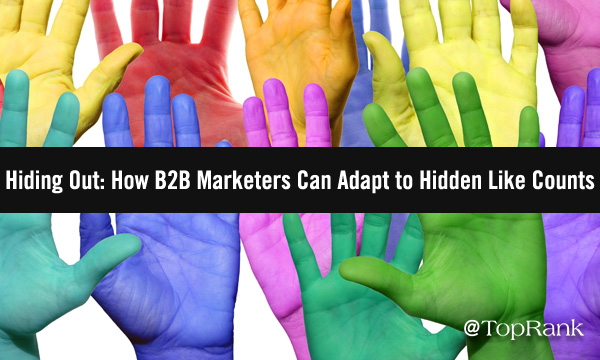
 Doesn't anyone like me? Where have all my likes gone? Likes on Instagram are being hidden, as the Facebook-owned firm recently began expanding a test program hiding the number of likes — or more accurately the small heart buttons we click to show support — that posts on the platform receive, showing the total number only to the person or brand who authored the post. via GIPHY Instagram head Adam Mosseri recently appeared on CBS This Morning and said, "We don't want Instagram to be such a competition. We want it to be a place where people spend more of their energy connecting with the people that they love and the things that they care about.” The change brought to some U.S. users what Instagram has had in the works since 2018, when it began testing hidden likes for certain users in Australia, Brazil, Canada, Ireland, Italy, Japan and New Zealand. The tests have brought praise from some, outrage from others, and caused some to voice concern that hiding like counts could have a negative impact on marketers, especially those involved in influencer marketing. It’s no wonder that concern has been expressed by some marketers, as by 2022 brands are expected to spend as much as $15 billion on influencer marketing according to recent forecast data from Business Insider. How will hiding like and other engagement counts affect customer engagement rates, and how will it change B2B influencer marketing? Let’s look at some of the ways that B2B marketers can adjust to the new hidden Web.
Doesn't anyone like me? Where have all my likes gone? Likes on Instagram are being hidden, as the Facebook-owned firm recently began expanding a test program hiding the number of likes — or more accurately the small heart buttons we click to show support — that posts on the platform receive, showing the total number only to the person or brand who authored the post. via GIPHY Instagram head Adam Mosseri recently appeared on CBS This Morning and said, "We don't want Instagram to be such a competition. We want it to be a place where people spend more of their energy connecting with the people that they love and the things that they care about.” The change brought to some U.S. users what Instagram has had in the works since 2018, when it began testing hidden likes for certain users in Australia, Brazil, Canada, Ireland, Italy, Japan and New Zealand. The tests have brought praise from some, outrage from others, and caused some to voice concern that hiding like counts could have a negative impact on marketers, especially those involved in influencer marketing. It’s no wonder that concern has been expressed by some marketers, as by 2022 brands are expected to spend as much as $15 billion on influencer marketing according to recent forecast data from Business Insider. How will hiding like and other engagement counts affect customer engagement rates, and how will it change B2B influencer marketing? Let’s look at some of the ways that B2B marketers can adjust to the new hidden Web.
Instagram Tests Hiding Like Counts — What Does it Mean?
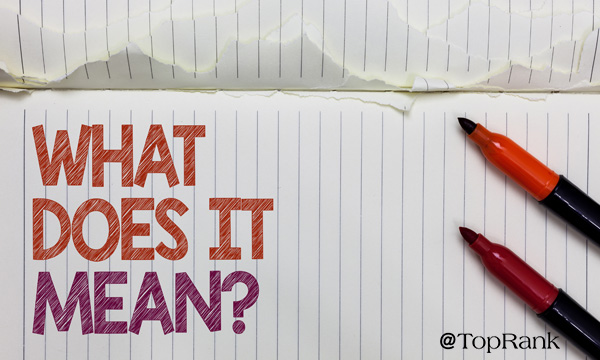 As we mentioned, the ability to click the heart button to like an Instagram post hasn’t gone away during the test, but only a post’s author will be able to see how many likes their item has received. Exactly how this will affect the various engagement metrics brands have in place remains to be seen, however the measurement of likes now faces a sizable challenge. Although Instagram and parent company Facebook have yet to release any results from the tests, or even any indication that they may become permanent, some firms have started to look at initial results using their own data. One early study of 154,000 Instagram influencers from influencer marketing platform HypeAuditor looked at how like counts were affected in the non-U.S. test countries, showing that among influencers with between five and 20,000 followers there was an across-the-board decrease in the total number of likes, as shown in the image below.
As we mentioned, the ability to click the heart button to like an Instagram post hasn’t gone away during the test, but only a post’s author will be able to see how many likes their item has received. Exactly how this will affect the various engagement metrics brands have in place remains to be seen, however the measurement of likes now faces a sizable challenge. Although Instagram and parent company Facebook have yet to release any results from the tests, or even any indication that they may become permanent, some firms have started to look at initial results using their own data. One early study of 154,000 Instagram influencers from influencer marketing platform HypeAuditor looked at how like counts were affected in the non-U.S. test countries, showing that among influencers with between five and 20,000 followers there was an across-the-board decrease in the total number of likes, as shown in the image below. 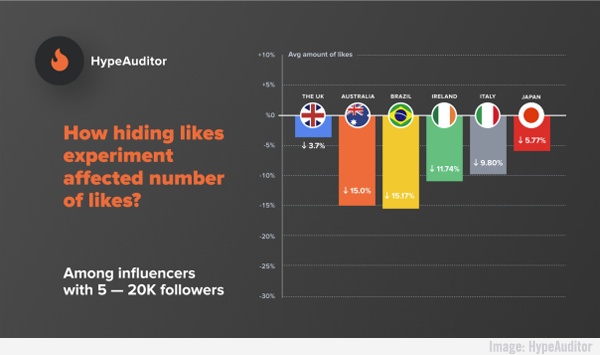 For influencers with between 5,000 and 20,000 Instagram followers, likes dropped between three percent and 15 percent in each of the nations, the study results showed. Among influencers with between 100,000 and a million Instagram followers, total like counts were also shown as having fallen, with the exception of those in Japan, where like counts surprisingly rose nearly seven percent, as shown in the chart below.
For influencers with between 5,000 and 20,000 Instagram followers, likes dropped between three percent and 15 percent in each of the nations, the study results showed. Among influencers with between 100,000 and a million Instagram followers, total like counts were also shown as having fallen, with the exception of those in Japan, where like counts surprisingly rose nearly seven percent, as shown in the chart below. 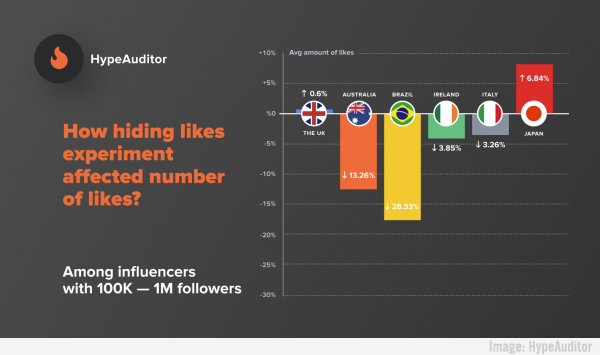 Australia’s Marketing Magazine took a look at the study results specifically in that county, in “Australian Like counts drop 15% following Instagram Like hiding test.”
Australia’s Marketing Magazine took a look at the study results specifically in that county, in “Australian Like counts drop 15% following Instagram Like hiding test.”
Top Influencer Qualities Measurable Far Beyond Likes
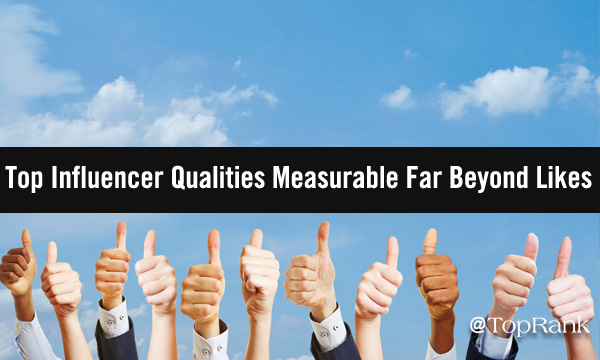 Research firm eMarketer recently produced a chart using data from GlobalWebIndex that shows which qualities U.S. and U.K. social media users see as the most important for influencers, as shown below.
Research firm eMarketer recently produced a chart using data from GlobalWebIndex that shows which qualities U.S. and U.K. social media users see as the most important for influencers, as shown below. 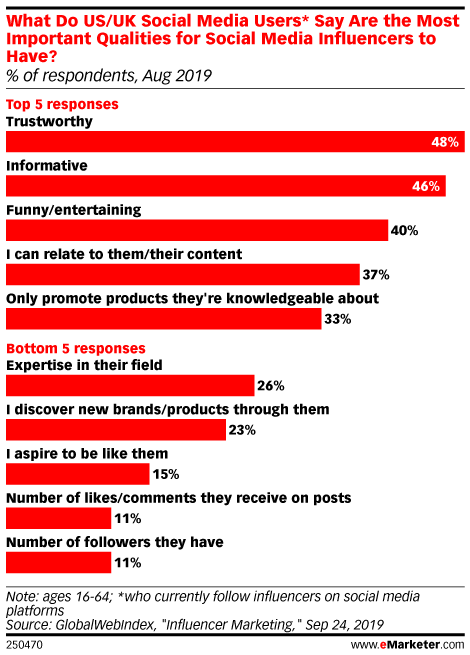 Trustworthiness, the ability to provide informative content, and being entertaining or humorous ranked as the top three social media influencer qualities in the study, while the total number of likes and followers an influencer has appears all the way at the bottom of the list. [bctt tweet="“Metrics that measure influencers by trust and the other qualities consumers value most will likely take on greater importance than those merely measuring likes and follower counts.” — Lane R. Ellis @lanerellis" username="toprank"] In a recent informal Twitter poll we asked B2B marketers which influencer quality they consider the most important in driving them to partner with an influencer on a campaign.
Trustworthiness, the ability to provide informative content, and being entertaining or humorous ranked as the top three social media influencer qualities in the study, while the total number of likes and followers an influencer has appears all the way at the bottom of the list. [bctt tweet="“Metrics that measure influencers by trust and the other qualities consumers value most will likely take on greater importance than those merely measuring likes and follower counts.” — Lane R. Ellis @lanerellis" username="toprank"] In a recent informal Twitter poll we asked B2B marketers which influencer quality they consider the most important in driving them to partner with an influencer on a campaign. 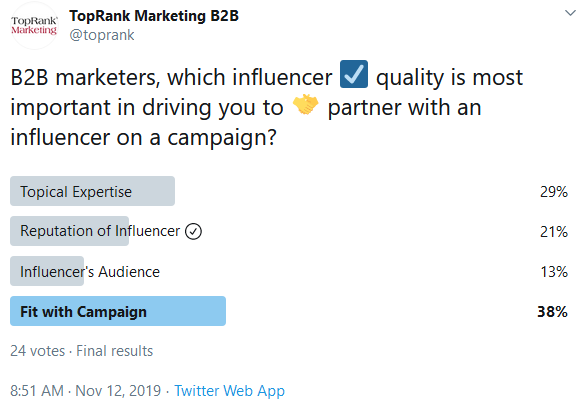 Will hidden like counts be a major trend in 2020? We asked that question in our latest Twitter poll, where you can chime in with your own vote on top 2020 marketing trends. We’ve written seven recent articles about the importance of trust in marketing, which you'll find below, and with like counts increasingly being hidden, now is a good time to re-focus on engagement metrics that incorporate trust.
Will hidden like counts be a major trend in 2020? We asked that question in our latest Twitter poll, where you can chime in with your own vote on top 2020 marketing trends. We’ve written seven recent articles about the importance of trust in marketing, which you'll find below, and with like counts increasingly being hidden, now is a good time to re-focus on engagement metrics that incorporate trust.
- Trust Begins Within: The Vital Importance of Building Internal Trust in Marketing
- Trust Factors: Why Your Brand Should Take a Stand with Its Marketing Strategy
- The B2B Marketing Funnel is Dead: Say Hello to the Trust Funnel
- Trust Fractures: How to Avoid Accidentally Eroding Your Brand’s Credibility
- Trust Factors: The (In)Credible Impact of B2B Influencer Marketing
- Trust Factors: How Best Answer Content Fuels Brand Credibility
- Tip of the Iceberg: A Story of Trust in Marketing as Told by Statistics
More Shoppable Links & Demetrification
 Instagram has given brands and influencers with more than 10,000 followers the ability to use its “swipe-up” feature to include an off-site link with referral or affiliate codes in Instagram Stories. Some brands and influencers have used these so-called “shoppable links” to drive purchasers directly to e-commerce platforms instead of merely seeking likes or shares. Wired explored some of the areas centered around the issue recently in “Why My Friend Became a Grocery Store on Instagram,” and earlier this year also looked at the so-called process of “demetrication,” and the affect it could have on social media use. Instagram isn’t the only major social platform to test changes in how like counts and other engagement metrics are derived. Twitter chief executive Jack Dorsey has shared his concern about the potential for overemphasizing like and follower counts, and his firm even launched a test that gave less weight to likes and re-tweets on the platform. These changes from Instagram, Twitter and other social platforms may help marketers usher in a move to new measurement and analytics strategies, particularly those with an increased focus on the importance of comments. Challenges that like counts have had to face include both pay-for-like schemes and fake likes driven by AI-powered bots, yet even a shift to metrics that focus more on comments won’t be entirely immune to attempts at gaming the system with fake responses. If Instagram and other social platforms permanently adopt hidden likes, influencer measurement tools and services will undoubtedly continue to look for the most reliable and accurate engagement signals that can be repeatedly measured. Since I first went online in 1984 with my 300-baud bulletin board system, one of the fundamentals of online communications has thankfully remained — the written comment. [bctt tweet="“With the recent drop in emphasis on like counts we’re seeing, the comment remains as one of the purest ways a person can show their support for a brand.” — Lane R. Ellis @lanerellis" username="toprank"] If consumers know their likes will be hidden, will it increase the likelihood that they’ll instead go the extra mile and take the time to write a comment? That remains to be seen, however 2020 is likely to produce an increased focus on comments and other forms of measurable engagement that don’t involve like, follower or share tallies.
Instagram has given brands and influencers with more than 10,000 followers the ability to use its “swipe-up” feature to include an off-site link with referral or affiliate codes in Instagram Stories. Some brands and influencers have used these so-called “shoppable links” to drive purchasers directly to e-commerce platforms instead of merely seeking likes or shares. Wired explored some of the areas centered around the issue recently in “Why My Friend Became a Grocery Store on Instagram,” and earlier this year also looked at the so-called process of “demetrication,” and the affect it could have on social media use. Instagram isn’t the only major social platform to test changes in how like counts and other engagement metrics are derived. Twitter chief executive Jack Dorsey has shared his concern about the potential for overemphasizing like and follower counts, and his firm even launched a test that gave less weight to likes and re-tweets on the platform. These changes from Instagram, Twitter and other social platforms may help marketers usher in a move to new measurement and analytics strategies, particularly those with an increased focus on the importance of comments. Challenges that like counts have had to face include both pay-for-like schemes and fake likes driven by AI-powered bots, yet even a shift to metrics that focus more on comments won’t be entirely immune to attempts at gaming the system with fake responses. If Instagram and other social platforms permanently adopt hidden likes, influencer measurement tools and services will undoubtedly continue to look for the most reliable and accurate engagement signals that can be repeatedly measured. Since I first went online in 1984 with my 300-baud bulletin board system, one of the fundamentals of online communications has thankfully remained — the written comment. [bctt tweet="“With the recent drop in emphasis on like counts we’re seeing, the comment remains as one of the purest ways a person can show their support for a brand.” — Lane R. Ellis @lanerellis" username="toprank"] If consumers know their likes will be hidden, will it increase the likelihood that they’ll instead go the extra mile and take the time to write a comment? That remains to be seen, however 2020 is likely to produce an increased focus on comments and other forms of measurable engagement that don’t involve like, follower or share tallies.
A Wealth of Social Engagement Measurement Tools
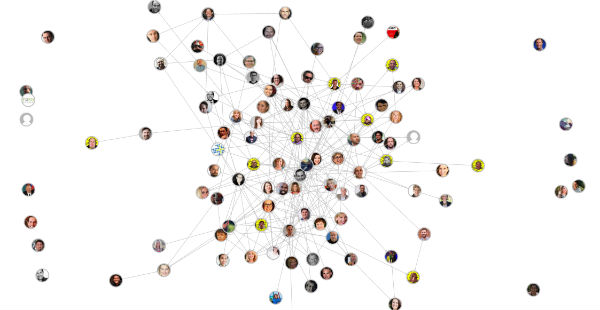 There have never been as many companies offering tools and services to measure marketing campaign success and engagement online as there are now, yet serious obstacles to thoroughness and accuracy abound, with an Internet today filled largely with walled communities that only allow certain data to be gathered for analysis. Even though the Internet is now 50 years old, and has brought about incredible and profound advances in many areas, there is still a long and largely unmarked path ahead before measuring engagement will ever be broadly accurate. Hope is certainly not lost however — far from it — as many excellent tools exist that work wonders with the data they’re able to pull in. We’re fans of influencer marketing platform Traackr, which we incorporate into our research when putting out our annual lists of the industry’s top influencers involved with B2B marketing, content marketing, women in marketing, and social media marketing.
There have never been as many companies offering tools and services to measure marketing campaign success and engagement online as there are now, yet serious obstacles to thoroughness and accuracy abound, with an Internet today filled largely with walled communities that only allow certain data to be gathered for analysis. Even though the Internet is now 50 years old, and has brought about incredible and profound advances in many areas, there is still a long and largely unmarked path ahead before measuring engagement will ever be broadly accurate. Hope is certainly not lost however — far from it — as many excellent tools exist that work wonders with the data they’re able to pull in. We’re fans of influencer marketing platform Traackr, which we incorporate into our research when putting out our annual lists of the industry’s top influencers involved with B2B marketing, content marketing, women in marketing, and social media marketing.
More To Hide — Shortened Snippets & The Rise of the “[...]”
via GIPHY More than likes and share counts are increasingly being hidden from our daily online excursions. I recall years ago when information online suddenly began to get hidden away in another way — not from businesses cutting off access entirely to data, but from a less-is-more minimalist Web landscape and design ethos that cut off tremendous amounts of information by truncating it and added either an ellipsis, “[...]” or a click-to-expand plus sign. This trend has continued largely unchecked for decades now, and you might be surprised if you take the time to sit back and count the sheer number of [...] occurrences you encounter online daily. I’m not the only one who’s been frustrated with webpages, services, and apps that truncate a great deal of information in the name of saving screen space, only to force us to click-to-expand sometimes dozens of times, and rarely is the helpful “expand all” option offered these days. I’ve often wondered — what percentage of the web is now hidden by default, and how many people ever click to see this hidden information? Thankfully, part of good search engine optimization (SEO) has always been knowing precisely how much text is visible to both consumers and to search-engine indexing robots and crawlers, to best take advantage of everything visible online today.A Likeless 2020 Brings New B2B Marketing Opportunities
via GIPHY The jury is still out on whether or not 2020 will see more social platforms hiding or placing less emphasis on like, share, and follower counts, but savvy B2B marketers will be prepared to shift to other facets of measurable campaign engagement. It’s an increasingly tricky and quickly-changing landscape for marketers, requiring expertise, dedication, and time — leading some to hire a professional B2B marketing agency like TopRank Marketing, which had the honor of being named by Forrester as the only B2B marketing agency offering influencer marketing as a top capability in its “B2B Marketing Agencies, North America, Q1 2019” report.” Whether you tackle the challenges ahead in 2020 in-house, on your own, or with a top-tier agency, the year ahead is certain to bring unforeseen marketing industry changes, which we’ll cover here on our blog and in our weekly video news round-up with Joshua Nite and Tiffani Allen, set to reach a milestone 200th episode early in 2020. In closing, here are six articles we’ve published this year that aim to help B2B marketers measure engagement:- New Year, New View: 3 Ways to Approach Analytics
- Measuring Content Marketing Success: Analytics Advice & Insight from the Experts
- How to Refocus on Your Audience for Better Content Marketing Results
- The Future of B2B Content: Data-Informed, Interactive, and Influential
- Want to Prove Content Marketing ROI? You Need an Actionable Marketing Dashboard
- Measure for Success: 7 Secrets of Actionable Content Marketing Dashboards
The post Hiding Out: How B2B Marketers Can Adapt to Hidden Like Counts appeared first on Online Marketing Blog - TopRank®.
from Online Marketing Blog – TopRank® https://ift.tt/2O6k3x3
via IFTTT
No comments:
Post a Comment